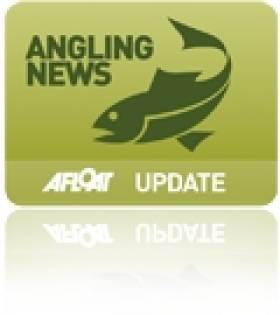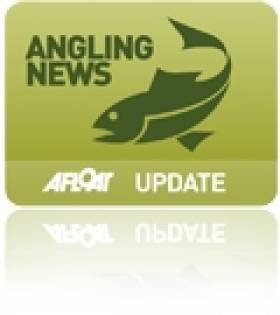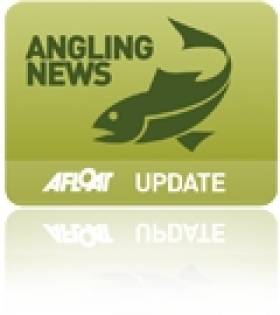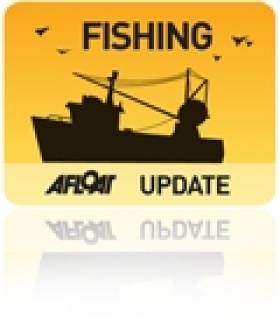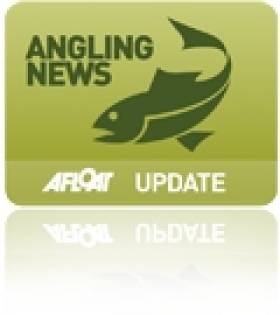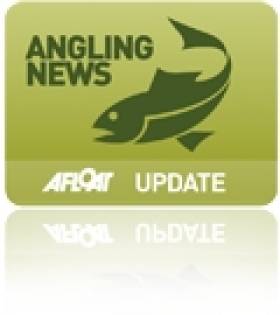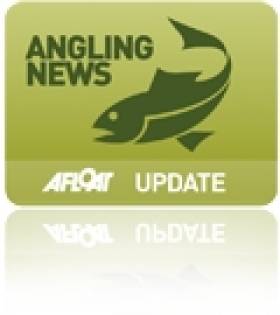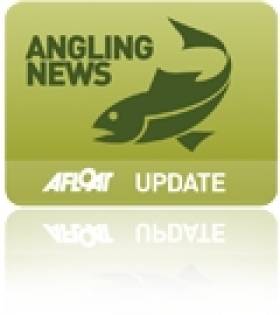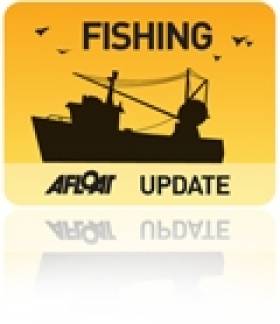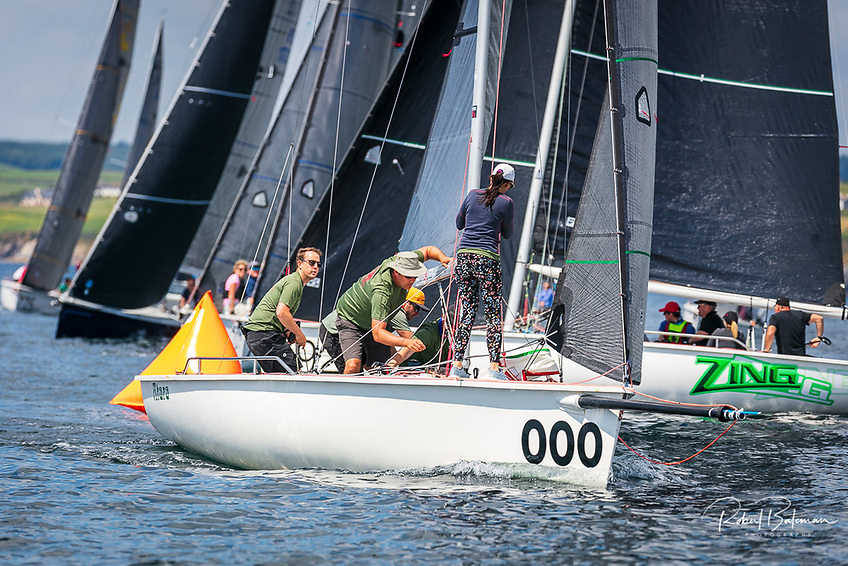Displaying items by tag: Inland Fisheries Ireland
Minister Welcomes IFI To New Citywest HQ
#IFI - Minister for Communications Energy and Natural Resources Pat Rabbitte has welcomed the arrival of Inland Fisheries Ireland (IFI) to its new headquarters at Lake Drive in Citywest.
On its establishment in 2010, IFI had accommodation at three locations in Swords, including leasing a headquarters building, and premises in Glasnevin and Blackrock.
But this year, as part of a strategic rationalisation, and in keeping with Government policy to exit from expensive leases wherever possible, IFI exercised the break clause on the Swords Headquarters when it arose and has already disposed of the Glasnevin premises.
“Accommodation is among the most significant cost components of public sector organisations, and in line with Government policy the board of IFI has undertaken a strategic rationalisation of its Dublin-based accommodation," said the minister.
"Following a review of some 100 options, the board has decided that Citywest is the optimal location."
Minister Rabbitte added that the major factors in this relocation "are the strategic and operational efficiency of Inland Fisheries Ireland as a national body with a strong statutory responsibility serving all parts of the country and the retention and development of invaluable technical, scientific and administrative expertise and experience.
“Citywest ticks all the boxes as regards accessibility, response capability on a country-wide basis, support structures and capacity for widely spread and often remote activities in resource protection, conservation and development.”
The minister's department says the rationalisation and amalgamation of all Dublin property is expected to generate efficiencies and savings over time in relation to lease rents.
In addition, the significantly better energy efficiency of the new headquarters facility in Citywest will be consistent with Government commitments as regards reducing CO2 emissions and energy consumption, will also generate efficiencies.
Inland Fisheries Ireland Moving To New HQ
#Angling - Inland Fisheries Ireland is on the move from its old offices in Blackrock and Swords to new headquarters at Citywest Business Campus.
As of Friday 25 April, all correspondence for staff at the State agency for inland fisheries and sea angling should be addressed to:
Inland Fisheries Ireland,
3044 Lake Drive,
Citywest Business Campus,
Dublin 24
Phone numbers will remain unchanged after the move, however 01 884 2600 and 01 278 7022 are currently offline until 7am on Monday 28 April.
During this period you can call IFI's other offices or the hotline on 1850 34 74 24 as normal.
Email is also offline until 7am on Monday. IFI apologises for any inconvenience caused.
IFI Invites Expressions Of Interest For Representation on Fishery District Committees
#Angling - Inland Fisheries Ireland (IFI) is inviting expressions of interest from suitably qualified individuals to become or continue to be members of Fishery District Committees in the following Fishery Districts where commercial fisheries exist:
- Waterford; Lismore; Cork; Kerry; Limerick;
- Galway; Ballinakill; Bangor; Ballina; Sligo;
- Ballyshannon and Letterkenny.
The individuals should be representative of one of the following groups/sectors:
- Commercial salmon fishermen (draft net or snap net where appropriate)
- Rated occupiers of fisheries
- Salmon rod representatives
Any suitably qualifying individual wishing to be considered for representation on these committees should write to Inland Fisheries Ireland at the address below stating the Fishery District in which they wish to be considered for inclusion on the committee and the group/sector to which they belong.
The primary purpose of the Fishery District Committees is to recommend the allocation of the available salmon surplus as identified by the National Standing Scientific Committee between the commercial and recreational sectors for those fisheries which have a surplus. Typically there will be one meeting per year (April). Expenses will not be paid.
Applicants will be assessed and may or may not be selected to serve on the committee. It is anticipated that this call for expressions of interest will be for the five-year period from 2014 to end of 2018.
Written applications (there is no official form) should be sent on or before 5pm on 28 February 2014 by email to [email protected] or by post to the following:
Inland Fisheries Ireland,
Fishery District Committees,
Teach Breac, Earl’s Island,
Galway
For more information on qualifying criteria or relevant ‘Frequently Asked Questions’ please see the IFI website HERE; for queries in relation to the above please call 091 563 118.
IFI Wins Another One As Coarse Fish Poachers Convicted In Navan Court
#Angling - There's been another successful prosecution for Inland Fisheries Ireland (IFI), this time against two people for coarse fishing offences on Whitewood Lake in Co Meath.
Grigorij Charlamov and Liudmila Baseva were convicted at Navan District Court on 10 January, respectively given community service and the Probation Act, while IFI was awarded €3,840 in expenses for bringing these cases.
In August 2013, Charlamov and Baseva were seen acting suspiciously at Whitewood Lake in Kilmainham Wood and were later apprehended by fisheries officers Dermot Wynne and Brendan Cusack.
The duo were found to have a boat, nets and 99 coarse fish in their possession which consisted of bream, roach, rudd and perch. This was in breach of the coarse fish byelaw which allows an angler to have four coarse fish under 25cm in their possession.
Charlamov, with an address in Bray, Co Wicklow, pleaded guilty to two charges. Judge Grainne Malone convicted him under Section 285A of the 1959 Fisheries Act, for using a boat as an aid to the commission of an offence and breaching the coarse fish byelaw of 2006.
Judge Malone noted that Charlamov had been well prepared, travelled from Bray and the consequences for him were therefore more significant. She gave him community service and he was ordered to pay costs of €1,920 to IFI within four months.
Baseva, also with an address in Bray, Co Wicklow, pleaded guilty to the breach of the coarse fish byelaw. Judge Malone convicted her under the bylaw, gave her the Probation Act and ordered her to pay costs of €1,920 to IFI within six months.
Whitewood Lake is a notable coarse fishery in Co Meath containing stocks of roach, bream, hybrids and pike. Many of the bream caught in this lake in 2013 were over 5 lbs in weight with an average age of 8-10 years, and very valuable from an angling perspective.
#FishFarm - Bord Iascaigh Mhara (BIM) has responded to concerns from environmental groups that an ingredient in treatments for sea lice in salmon farms poses a threat to wild marine life.
As Galway Bay FM reports, campaigners Galway Bay Against Salmon Cages - one of the groups opposed to the planned Galway Bay fish farm - say that cypermethrin, an active ingredient in veterinary medicine used to treat sea lice, is toxic to aquatic organisms.
BIM aquaculture manager Donal Maguire attempted to play down fears over the use of the pesticide, saying it has been fully tested for toxicology in the marine environment.
However, another campaign group claims BIM's position is contrary to the manufacturer's own warnings on the use of the drug.
According to FishNews.eu, Friends of the Irish Environment (FIE) cited the Irish Medicines Board's product description for cypermethrin, which states that it is "dangerous to fish and other aquatic life" and demands that the chemical "should not be allowed to contaminate water".
FIE went on to describe cypermethrin as "a biocide which kills life, not a medicine that saves lives" and as "a highly active neurotoxin" with "known effects on fish and, most sensitive of all, crustaceans such as crabs and lobsters. Bathers and watersports [enthusiasts] may also be at risk."
Earlier this month, Inland Fisheries Ireland (IFI) expressed "serious concerns" over the findings of a study on wild salmon in Ireland that claimed fish farm schemes were less harmful to wild fish than pollution and possibly even beneficial to wild catchments.
IFI is among the significant opposition to BIM's proposed organic salmon farm off the Aran Islands, a 500-hectare project that would be the largest of its kind in Europe and create hundreds of jobs in the locality.
Request For Assistance In National Bass Programme
#Angling - Inland Fisheries Ireland (IFI) has put out a request for assistance in its new National Bass Programme.
IFI has established the National Bass Programme to collect data on bass in order to provide scientific advice to support management and conservation of Ireland’s bass resource.
Bass is Ireland’s only marine fish species which is managed for angling.
The programme is being developed to determine the status of bass stocks and also to improve understanding of their ecology and biology in Ireland for the long-term sustainability of the species.
All assistance with the National Bass Programme would be greatly appreciated. If you would be interested in sending bass scale samples, the IFI can provide you with a scale envelope pack.
Minister Marvels at Young Anglers in Fly Fishing Worlds
#Angling - Minister of State Fergus O'Dowd gave some words of encouragement ahead of the World Youth Fly Fishing Championships taking place this week till 26 July in venues across Louth, Monaghan, Meath, Tyrone and Antrim.
The event will help to showcase the wonderful angling amenities on the island of Ireland, And with competitors all in the 14-18 age bracket, it will also promote the wonderful sport of recreational angling to young people.
Minister Fergus O'Dowd, who attended the launch of the event, encouraged the youthful competitors and marvelled at their ability to "take challenges in their stride at such a young age and compete wholeheartedly and sportingly".
The minister also acknowledged the important economic and social impact angling has on rural communities, bringing much needed revenue and jobs.
Inland Fisheries Ireland (IFI) chief Dr Ciaran Byrne added that the national fisheries body is "delighted to be the main sponsor of this prestigious event.
"IFI, through its sponsorship scheme, aims to promote youth angling but also ensure best practice, and in that regard IFI is providing the biosecurity measures for this competition."
Along with IFI, the Loughs Agency, DCAL, Fáilte Ireland and local businesses are supporting the great work of the organising committee under the guidance of the Leinster and Ulster councils of the Trout Angling Federation of Ireland. The competition is a cross-border initiative run under the regulation of FIPS Mouche.
Angling Worth €0.75bn to Irish Economy Annually
#Angling - Minister of State for Natural Resources Fergus O’Dowd has warmly welcomed the findings of a new national economic study that reveals for the first time that angling and angling tourism in Ireland are generating a dividend in excess of €0.75 billion within the Irish economy every year.
The study, commissioned by Inland Fisheries Ireland (IFI), shows direct spending on angling in Ireland amounted to €555 million in 2012, with indirect spending worth an additional €200 million and totalling €755 million.
Recreational angling was also found to directly support 10,000 existing Irish jobs, many of which are located in the most peripheral and rural parts of the Irish countryside and along our coastline.
The study - titled a Socio-Economic Study of Recreational Angling in Ireland - found that 406,000 people were involved in recreational angling in Ireland last year, with over 150,000 of these travelling from Northern Ireland and overseas.
Over a quarter of a million Irish adults (252,000) held a fishing rod last year with sea angling along with salmon and brown trout angling seen as the most popular categories where domestic anglers are concerned.
The quality of the Irish angling product, the friendliness and hospitality of the Irish people and our outstanding scenery were cited amongst the principal attractions of Ireland as an international destination for recreational angling. Tourism angling spend is estimated at approximately €280 million on an annual basis.
Speaking at the launch of the study at the Royal College of Physicians on Kildare Street, Minister O'Dowd admitted that the findings had come as a surprise, as this was the first national survey which was able to put a value on angling to the economy and that up till now the economic significance of the sector had been greatly underestimated.
The minister said the study not only highlighted to him the major economic impact that angling makes to the Irish economy, but it also underlined the need to continue to protect and nurture this valuable resource, if it is to be allowed to develop and grow to achieve its full potential.
“The results contained in this report are significant,” he said. “Angling, as a recreational pursuit, is a major contributor to the fabric of Irish life in all parts of the country, particularly in rural and peripheral areas.
"From the industry perspective, the strategic development and marketing of our angling product is essential and has been given new impetus in light of what we now know about the visiting and spending patterns of anglers and what is important in drawing them here.
He added that it is "equally clear to me that maintaining a strong focus on the protection and conservation of this vital resource into the future is absolutely key if we are to properly sustain and grow these benefits to anglers, angling businesses and the Irish economy.”
The study, commissioned by IFI in early 2012 and undertaken by consultants Tourism Development International, was undertaken to help underpin effective strategic planning and decision making in respect of the angling product’s development and marketing.
IFI chief Dr Ciaran Byrne commented at the launch that the national fisheries agency “will now review the results of the survey in conjunction with our stakeholders. Clearly fish stocks and fish habitat must be conserved, protected and developed. Angling businesses must be given every opportunity to win business and secure and grow the jobs within the sector.
"IFI is committed to these goals and together with our stakeholders and the support of Government, state agencies and a new angling marketing and development plan we will achieve them.”
The study is available to download from the IFI website HERE.
'Fish In Distress' Alert as Water Levels Fall in Heatwave
#Angling - Inland Fisheries Ireland (IFI) is seeking the help of anglers and the general public to report any sightings of distressed fish due to high water temperatures or low water levels.
The national fisheries body also requests that anglers voluntarily cease using keep nets during this period, so as not to cause unintentional distress to fish kept for long periods in these nets.
Reports may be made to the local fisheries offices or the 24-hour hotline number on 1890 34 74 24.
IFI staff will continue to monitor canals, lakes and rivers for any signs of distressed fish in shallow water, but may be able to react more quickly to timely reports received.
"Low water levels and high water temperatures may lead to fish kills," said IFI chief Dr Ciaran Byrne, "and as the temperatures for salmon and trout are perilously hot at the moment, fish kills may be unavoidable. In many instances, moving fish may also prove too stressful.
"Anglers practicing catch and release during this hot spell may wish to consider desisting from fishing until conditions are more favourable."
Minister Fergus O'Dowd also urged anglers and the public to "please be vigilant and help conserve our wonderful inland fisheries resource".
Local Fisheries Offices contacts:
- IFI Swords – 01 884 2600
- IFI Limerick – 061 300 238
- IFI Blackrock – 01 278 7022
- IFI Galway – 091 563 118
- IFI Clonmel – 052 618 0055
- IFI Ballina – 096 22788
- IFI Macroom – 026 41222
- IFI Ballyshannon – 071 985 1435
#Fishing - The Irish Times reports that Inland Fisheries Ireland (IFI) has expressed "serious concerns" over the findings of a new study on wild salmon in Ireland.
The State agency for Ireland's fisheries argues that the study - which concluded not only that pollution has a greater impact on wild salmon numbers than fish farming, but also that salmon catchments in close proximity to aquaculture schemes were some of the best performing - is based on flawed methodology.
IFI is among the chorus of voices opposed to the planned organic salmon farm off the Aran Islands in Galway Bay - a 500-hectare project by Bord Iascaigh Mhara (BIM) that would be the largest of its kind in Europe if given the go-ahead.
Marine Minister Simon Coveney recently attempted to alleviate concerns over the controversial scheme, claiming there would be no damage to the environment or fish stocks.
However, the controversy doesn't end there, as last month celebrity chef and 'Slow Food' champion Darina Allen wrote to the minister over erroneous claims in BIM's environmental impact statement (EIS) for the project.
As reported by the Galway Independent, Allen contacted Minister Coveney to clarify that the Slow Food movement does not support fish farming projects, after references to the initiative in the EIS "seemed to create a lot of confusion".
Allen told the paper: “Many people contacted me under the perception that Slow Food endorsed the whole salmon farm thing and actually Slow Food has made no statement whatsoever on it.”
Later, Michèle Mesmain of Slow Food International confirmed that “salmon farming does not fit in any pillar of Slow Food”.
The Galway Independent has much more on the story HERE.



























